Did We Really Need 17 Debates Before The New Hampshire Primary?
Can anyone bring the primary debate schedule under control?
So far this cycle we’ve had seventeen debates among the Republican candidates for President (not including the two “Lincoln-Douglas Style” Debates that Newt Gingrich held), and there are four more scheduled between now and the end of January. Most of them memorable for the wrong reasons, usually something related to the manner in which the debate was conducted by whatever network was broadcasting it. ABC News, for example, has conducted two of the most least insightful debates of the entire cycle, while CNN has engaged in sometimes idiotic gimmicks (anyone remember “This or That?” from the first CNN debate for example?) That, along with the sheer number of debates has led some Republican Party leaders to wonder if the RNC needs to take more control of the process in the future:
NASHUA, N.H. — Way back when, before this year’s field of Republican presidential candidates had even taken shape, GOP national Chairman Reince Priebus raised his hand with a plan to get a grip on the burgeoning number of televised debates.
In words that were one part prescient, one part naive, Priebus in April warned at a media breakfast: “The idea of twenty different forums and twenty different groups is a little much. We need to have some order in our debate process.”
Priebus’s effort to have a Republican National Committee commission take control of the process quickly got answers from presidential campaigns and sponsoring news organizations: nice try. And fat chance.
Now, even as 2012 primary voting is just underway, a debate about debates for 2016 and beyond is percolating among Republican elders and even some Democrats, who did not have the challenge the GOP had this time in controlling the schedule and format of candidate forums but will have it four years from now. Several are encouraging the national party to assert itself in ways that Priebus tried but failed to do this time around.
“I thought it got out of hand,” former RNC Chairman Frank Fahrenkopf, who is co-chairman of the Commission on Presidential Debates, the group that organizes general election debates, said of this cycle’s 15 encounters so far.
“I would rather see a system where it’s agreed to that there will be seven or eight and spread them out across the proper states,” Fahrenkopf said. “But doing one every other night is ridiculous.”
Last month, in the midst of the controversy over the aborted Newsmax-sponsored debate that would have been hosted by Donald Trump, Karl Rove made a similar point:
For the most part, the debates have been helpful. Before them, the “generic Republican” never led President Barack Obama in any Gallup survey. Since early July, the generic GOPer has often been leading Mr. Obama. The debates likely contributed to this shift.
Still, there can be too much of a good thing. Debates have nearly crippled campaigns, chewing into the precious time each candidate has to organize, raise money, set themes, roll out policy and campaign.
Each debate kills at least three days: one day (and sometimes two) to prepare, the day of the debate, and the day after, spent dealing with the fallout from the night before. This late in the process—there are 19 days until Iowa and 26 days until New Hampshire, with the Christmas and New Year’s holidays eliminating crucial campaign days—many candidates might want to chart their own schedules and set their own message priorities. But the debates won’t allow for that.
This also needs to be said: What we’re watching are not really debates. They are seven- or eight-person news conferences. Their choppy nature makes cogent argument difficult and thoughtful policy discussion almost nonexistent. There’s a premium placed on memorable sound bites and snappy comebacks. Those are the clips that are endlessly replayed.
Debates transfer power to the media, draining it from the campaigns. Moderators and their news organizations—through questions they frame or select—have more impact than candidates on what’s covered and discussed. Because each debate is a lavish feast of comments and confrontations, the media also decide what aspects are most worthy of post-debate coverage.
Of course, where you stand on this issue often depends on where you sit. It’s not surprising that party insiders and campaign operatives like Rove aren’t entirely thrilled with the plethora of debates on the schedule because it takes control of the campaign process out of their hands, and out of the hands of the directors of the other campaigns. It makes it harder for them to control the message that is going out to the public, and it involves a series risk that their candidate will say or do something that will push them off message. From that perspective, the fewer the debates the better is the preference, which is why Newt Gingrich’s idea for a series of “Lincoln-Douglas Debates” leading up to the General Election would never see the light of die. Neither Presidential campaign would ever agree to it. As it is, we’re lucky that we get the four debates between the two General Election candidates that we do (remember that there were no General Election Presidential debates between 1960 and 1976).
Candidates themselves also have a different view of these debates depending on where they sit. Top tier candidates would generally prefer to limit the number of debates generally, and especially limit the number of times that they have to share the stage with lesser candidates who are likely to do nothing more than take shots at the time. Lower tier candidates, of course, generally feel differently about the topic and you always hear complaints from those candidates who are excluded from debates about unfair debate criteria in the early stages of the race.
Then, of course, there’s the media. Even in the early stages, many of these debates have brought in very good ratings, which is rare for news-related programming. Saturday night’s debate, for example, brought in 6.25 million viewers. While that was down from the previous two debates in December, it was still pretty high for a news program on a Saturday night up against an NFL Wild Card game. Even the Sunday morning debate that was held a mere 10 hours later brought in a fairly good 4.16 million viewers. It’s not surprising, then, that network news divisions have been eager to get on the debate bandwagon. At the same time, though, some political reporters recognized at a forum held last night that there’s a downside to so many debates:
Prominent media figures debated Monday at the POLITICO-sponsored ‘New Hampshire Primary Preview’ whether there were too many debates in the Republican primary race, with NBC’s Chuck Todd and ex-CBS news anchor Dan Rather decrying the abundance of debates.
“It got turned into a reality show. I’m sorry, I think there are all sorts of ways to blame this… but I think there are too many. I think it took away from the retail campaigning,” said NBC News political director Todd, before a crowd of over 240 people at St. Anselm College in Manchester, N.H. “The last couple of cycles we’ve seen people run for president to earn a living… all we’ve done with this debate process is enable the process to encourage more celebrity politicians.”
“We should have had one a month in the odd numbered years, and then, once Iowa and New Hampshire started, fine, it’s open season,” Todd added.
Rather concurred.
“I find myself with debate fatigue – there have been so many. As long as you can make it a special event, I think that’s what is most valuable,” Rather said. “Generally speaking, I’m of the school: the more debates, the better. But this gives me a lot of pause – I do think this time around, by the time we get through the primary campaign, there will have been too many.
This is all well taken, of course. At this point, when we’re still dealing with multi-candidate debates that include people who have no realistic chance of winning a single primary or caucus, never mind the election, it’s hard to find anything of value in yet another debate. That’s going to change soon, however. We may lose candidates before South Carolina, and I’d suggest we definitely lose candidates before the two Florida debates. Then, when you’ve got three, or maybe four, candidates on the stage, there’s a possibility for real discussions, as we learned during the final months of the Obama-Hillary battle in 2008. Of course, if things keep going the way the are this race is likely to be over shortly after January 31st anyway.
There’s a fourth player in this mess that makes any effort to bring it under control more difficult. Many of the debates that we’ve seen over the past eight months were co-sponsored by organizations that aren’t really subject to the influence of the Republican or Democratic National Committees. Among those co-sponsors have been Google Facebook, The Heritage Foundation, The American Enterprise Institute, The Family Leader, various Tea Party organizations, and two institutions of higher learning (Oakland (MI) University and St. Anslem College). State party organizations in South Carolina, Iowa, and elsewhere have also co-sponsored debates. Some of these groups were probably motivated by a sense of public service, but most of them had other reasons for being involved, including the opportunity to advance their own influence in the public policy world. How the national parties are going to control what these groups do is unclear.
Nonetheless, Mark McKinnon, the former McCain adviser who is now involved in the “NoLabels” group, suggests one possible way to fix the debates:
To bind candidates to a protocol, a mutually beneficial agreement has to be reached between the Republican National Committee and the Democratic National Committee well ahead of anyone announcing their candidacy for 2016. Any agreement should establish:
1. Criteria for candidate participation
2. Length and format of debates
3. Number of debates that should be sanctioned and when they should be scheduled
4. Ideal number of candidates per debate (and strategies to accommodate)
5. Criteria for sponsorship and partnership
6. Guarantee of equal time and number of questions
7. Appropriate venues
8. Methods for determining podium or seating orderAs a first step, the Institute of Politics and The Joan Shorenstein Center on the Press, Politics and Public Policy at Harvard University have agreed to sponsor and facilitate a discussion beginning with a closed-door, off-the-record session in May or June 2012 with key players from the RNC and DNC, as well as representatives from the Republican campaigns of 2012, and the 2008 campaigns of President Barack Obama and Sen. Hillary Clinton.
Perhaps this will lead to something productive and workable. The ideal situation, obviously, would be if both parties had an open field in 2016 so that the plan could be implemented all at once, otherwise one party or the other is going to have to try to do this alone and that makes the whole process harder to implement.
A few thoughts come to mind, though:
- At least in the early stages, the criteria for participation should be as open as possible. Candidates who have served as Governor, or in the House or Senate, should be included as a matter of course. The fact that candidates like Gary Johnson and Buddy Roemer were excluded from early debates, while candidates like Herman Cain were given the free media that helped them rise in the polls was absurd, for example. Roemer served in Congress and as Louisiana Governor, Johnson was a successful two-term Republican Governor in a mostly Democratic state, both should have at least been given the opportunity to introduce themselves to a national audience. For candidates without political experience, participation should be based on either poll standing or fundraising ability.
- More than two or three debates before Labor Day of the year before the election makes no sense whatsoever. Most voters aren’t focused on politics at that point anyway. Also, the debates that are held during this period should be held in states that will be important in the early stages of the Presidential race so that voters there have a chance to see all the candidates.
- Networks and members of the political press should take a serious look at the Presidential forum that Mike Huckabee conducted in early December. As I noted at the time, this debate included multiple candidates and panel of questioners but, except for the final segment, each candidate was given their own time to answer questions in at least some degree of detail. There is far too much focus in these debates on which candidates got off the best zinger, which one told the funniest joke, and which candidate attacked the frontrunner most effectively. Especially in the early stages, the purpose of these debates-that-aren’t-really-debates-anyway should be to learn more about the candidates while at the same time subjecting them to scrutiny.
- Whoever came up with the idea of having two multi-candidate debates ten hours apart should never be allowed to plan another debate again. I’m serious. That was just a dumb idea, and I’m actually surprised that the campaigns agreed to it given the risk that fatigue would make it more likely that their candidate would make a needless mistake.
Will any of this be implemented? Much as with the reforms that ought to be made to the primary schedule, it’s not going to be easy and it’s more likely than not that any effort to bring this system under control will fail. Nonetheless, it’s worth a try because this has been one insane year.
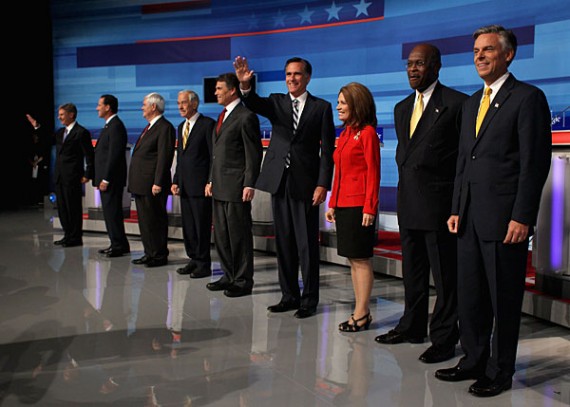

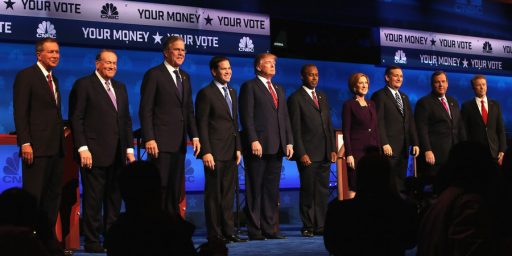
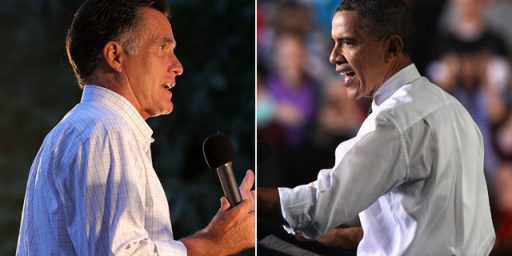
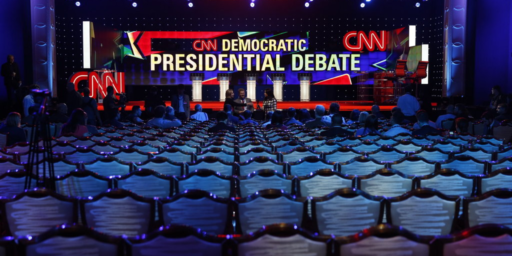
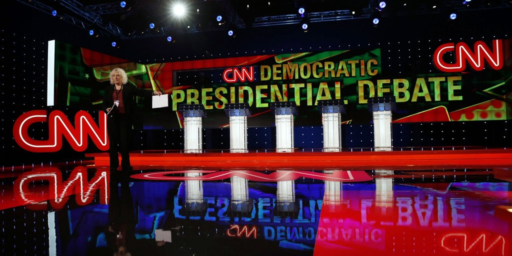
Maybe not, but goddamn they provided some of the funniest TV all year. Every time Cain spouted off, “Nine, nine, nine”, all I could think of was Brad Pitt in the Inglourious Basterds, “Yes, yes, yes”. Those Perry brain freezes were a schadenfreudist’s joy to behold. And Michele, ah, Michele — tell me her ditzyness wasn’t endlessly entertaining? And Newt — Jesus, what’s he gonna say or do next? The gift that keeps on giving. Then there’s Mitt Romney doing his Stepford politician number.
C’mon. You can add you own examples. What great television. No?
“this has been one insane year” True dat.
Given the enormous power of the Iowa and New Hampshire electorates, who essentially cull the field to 2 or 3 viable candidates before a single non-white urban voter gets to cast a ballot, I’m actually in favor of the debates taking the race more national. The less influence that pancake breakfasts and coffee houses have on the process, the better as far as I’m concerned.
The only real downside that I see is that candidates who don’t get invited to the debates–Buddy Roemer and Gary Johnson being the most notable this cycle–become automatic non-factors. I’m not sure how to solve that problem, though.
Debates are infinitely better than campaign ads and somewhat better than either retail campaigning or most candidate interaction with journalists. What has made this round of debates so tiresome is the sad state of the field and the poor performance of the debate moderators. There”ve been how many questions about the Euro financial crisis in all of the debates put together?
Mike
Before we undertake an effort to limit the number of debates it would be nice to hear some more persuasive reason(s) to do so. I, for one, am going to have a hard time rallying around the “Dan Rather Is Just Way Too Tired” message.
Yes, because it weeded out the incompetents. We might have nominated Perry if not for the many debates.